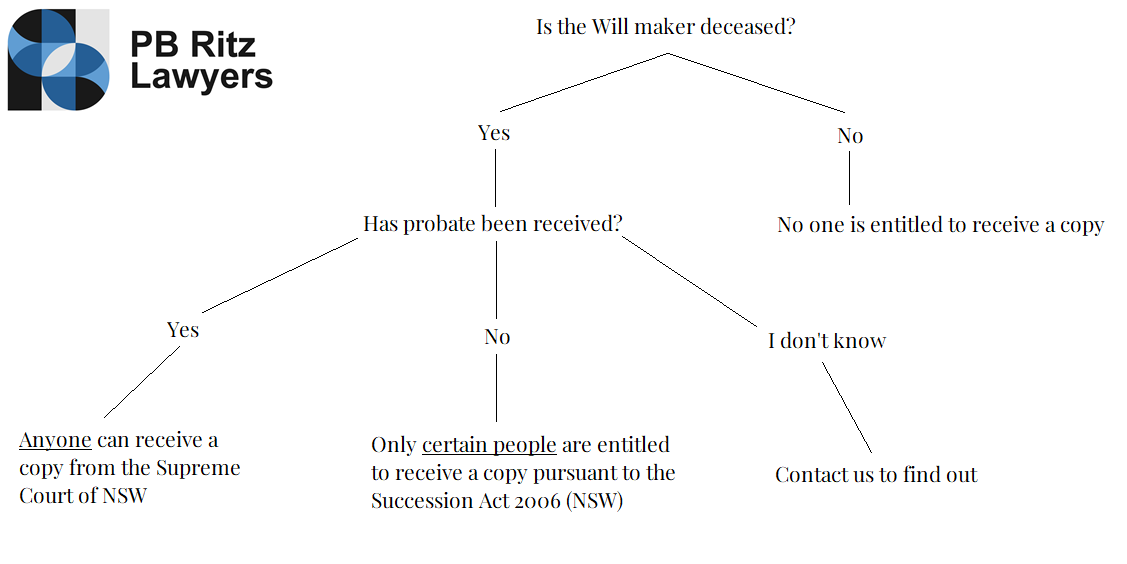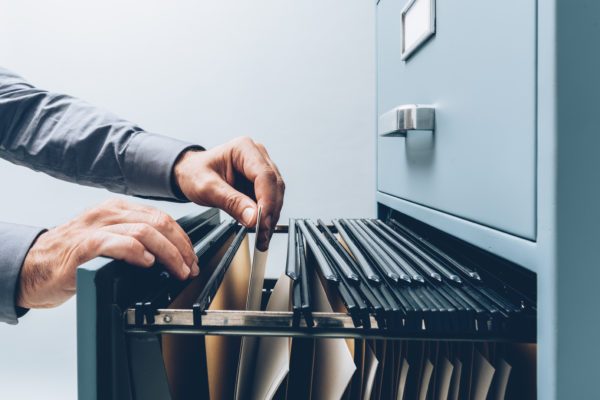If you are interested to contest or challenge a Will in NSW the first thing you need to do is get a copy of the Will so you can establish if you are a beneficiary.
To assist you with this task we have answered some common questions we are asked when it comes to getting a copy of a Will in NSW. If you’re considering how to get a copy of a will in NSW, read on to get a better understanding of who can get a copy, when an executor may be able to get a copy, and how to potentially get a copy of a will in NSW.
Who can get a copy of a Will in NSW?
No one, not even the Will maker’s spouse, power of attorney, executor, or beneficiary, is entitled to receive a copy of a person’s Will while the Will maker is still alive. Of course, the Will maker can provide a copy of their Will to whomever they like but they are not obligated to do so.
Once the Will maker dies, depending on the circumstances, you may be entitled to receive a copy of their Will.
If a grant of probate is received for the deceased’s estate any person is entitled to receive a copy of the Will from the Supreme Court of New South Wales if they pay the relevant fee.
If a grant of probate is not received for the deceased’s estate, the Succession Act 2006 (NSW) dictates who is entitled to receive a copy of the deceased’s Will. In New South Wales, where no grant of probate is received, you are entitled to receive a copy of a Will from any person who has possession or control of the Will if you are:
- Named or referred to in the Will;
- Named or referred to in an earlier Will as a beneficiary;
- The surviving spouse, de-facto partner, or child;
- The parent or guardian of the deceased;
- Entitled to a share if the deceased died intestate (i.e. without a Will);
- A parent or guardian of a minor referred to in the Will (or who would be entitled to a share if the person died intestate);
- A person/creditor who may have a claim against the deceased’s estate;
- A person who managed the deceased’s personal estate immediately before death;
- An attorney under the deceased’s enduring power of attorney.

Is a Will a public document in NSW?
A Will becomes a public document if a grant of probate is received for the Will. Any person is entitled to receive a copy of the Will from the Supreme Court of New South Wales if they pay the relevant fee.
If a Will is not admitted to probate you cannot obtain a copy of the Will from the Supreme Court of New South Wales. In this situation you can only obtain a copy of the Will if you are entitled to receive a copy pursuant to the Succession Act 2006 (NSW).
How to get a copy of a Will in NSW?
One of the first questions we are asked, by clients who want to dispute a Will, is how to get a copy of a Will in NSW.
If you know who the executor is, and you are entitled to receive a copy pursuant to the Succession Act 2006 (NSW), then you should request a copy of the Will from that person. Keep in mind the executor is usually the deceased’s spouse, eldest child, or next of kin.
If you do not know who the executor is we can assist you to find out.
If a grant of probate has been received for the deceased’s estate then you can get a copy of the Will from the Supreme Court of New South Wales if you pay the relevant fee.
Can anyone request a copy of a will in NSW?
It depends if the Will is admitted to probate or not.
If a grant of probate is received for the Will then any person can obtain a copy of the Will from the Supreme Court of New South Wales if they pay the relevant fee.
If the Will is not admitted to probate then only the persons entitled to receive a copy pursuant to the Succession Act 2006 (NSW) can obtain a copy.
Where are Wills kept?
Wills are generally kept with the law firm that prepared the Will for the deceased or by the Will maker themselves.
If the Will maker keeps the Will our experience is they generally store the original together with their personal papers, such as their passport, certificates of title for their properties, and other important documents.
If the Will maker has a safe the original is often stored there.
Sometimes Will makers store their original Will with their bank or with the New South Wales Trustee and Guardian if the Will was prepared by them.
How do you find out if someone has left a Will in NSW?
Follow these 4 simple steps to find out if someone has left a Will in NSW:
- Your first port of call should be to reach out to the deceased’s spouse, eldest child, and/or next of kin to enquire regarding the existence of a Will. If you are not entitled to receive a copy of the Will pursuant to the Succession Act 2006 (NSW) it is unlikely they will provide you with a copy however they may still inform you if the deceased left a Will in NSW.
- If you know the name of the law firm or lawyer that assisted the deceased with conveyancing or other legal matters prior to their death you could contact them to enquire regarding the existence of a Will. Keep in mind, if you are not entitled to receive a copy of the Will pursuant to the Succession Act 2006 (NSW) they will not provide you with a copy.
- If you are not entitled to receive a copy of the Will pursuant to the Succession Act 2006 (NSW), or if you would prefer to keep your enquiries secret for now, another way to determine if someone has left a Will in NSW is to create an account with the NSW Online Registry. Once the account is set up you can conduct a free search using the deceased’s first and last name to see if a notice has been published in relation to the deceased’s estate.
If a notice of intention to apply for probate has been published that means the deceased has left a Will whereas if a notice of intention to apply for a grant of letters of administration has been published that means the deceased died without a Will.
- Get help from a solicitor. If you would like assistance with the above steps give us a call.
Can an executor of a Will also be a beneficiary?
Yes, an executor of a will can also be a beneficiary. For example, it is common for a Will maker to appoint their spouse or children as executors and beneficiaries of their estate.
Is a Will read before or after a funeral?
Usually the Will is read by the Executor after the funeral takes place.
Unlike what you see in movies, a formal reading of the Will does not usually take place and often the Executor knows what the Will says before the Will maker dies.
Who contacts beneficiaries of a Will?
The executor, or the solicitor that acts for the executor, will contact the beneficiaries shortly after the deceased’s death to notify them that they are a beneficiary of the deceased’s estate.
Do solicitors hold copies of Wills?
Solicitors who prepare Wills are encouraged to keep an electronic copy of the Wills they prepare for clients.
Solicitors usually store the original Will on behalf of their clients too.
Can an executor refuse to pay a beneficiary?
It depends how the gift is structured in the Will and whether the executor has been notified of a potential Will dispute.
Generally speaking, if the beneficiary is over 18 years of age, and the gift is not structured to be held on trust for the beneficiary, and the executor has not been notified of a potential will dispute, the executor cannot refuse to pay a beneficiary his or her entitlement.
However, keep in mind on average beneficiaries are paid their entitlements about 6 to 8 months after the deceased’s date of death as this is generally how long it takes for an executor to complete their duties, which may include obtaining a grant of probate and completing tax returns for the deceased person, amongst other things.
Can an executor see a Will before death?
An executor can see a Will or receive a copy of a Will before the Will maker’s death if the Will maker provides a copy of the Will to their executor.
If the Will maker does not want the Executor to see or have a copy of their Will before their death the Executor has no right to do so.
Any questions?
We hope this article has clearly explained how to get a copy of a Will in NSW. If you need help getting a copy of a Will in NSW or if you have any questions we would be happy to help.


